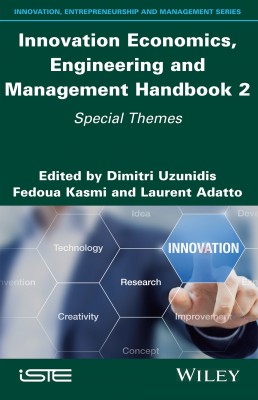
Innovation, in economic activity, in managerial concepts and in engineering design, results from creative activities, entrepreneurial strategies and the business climate. Innovation leads to technological, organizational and commercial changes, due to the relationships between enterprises, public institutions and civil society organizations. These innovation networks create new knowledge and contribute to the dissemination of new socio-economic and technological models, through new production and marketing methods.
Innovation Economics, Engineering and Management Handbook 2 is the second of the two volumes that comprise this book. The main objectives across both volumes are to study the innovation processes in today’s information and knowledge society; to analyze how links between research and business have intensified; and to discuss the methods by which innovation emerges and is managed by firms, not only from a local perspective but also a global one.
The studies presented in these two volumes contribute toward an understanding of the systemic nature of innovations and enable reflection on their potential applications, in order to think about the meaning of growth and prosperity.
1. Meaning – The Meaning of Innovation: Theoretical and Practical Perspectives, Joëlle Forest.
2. Engineering – Innovation Engineering: A Holistic and Operational Approach to the Innovation Process, Laure Morel and Mauricio Camargo.
3. Absorption – Technological Absorptive Capacity and Innovation: The Primacy of Knowledge, Sonia Ben Slimane.
4. Big Data – Artificial Intelligence and Innovation: The Big Data Issue, Laurent Dupont.
5. Blockchain – Blockchain and Co-creation within Management Methods, Eric Seulliet.
6. Bricolage – From Improvisation to Innovation: The Key Role of “Bricolage”, Paul Bouvier-Patron.
7. Circularity – The Circular Economy as an Innovative Process, Sonia Veyssière.
8. Co-creation – Co-creation and Innovation: Strategic Issues for the Company, Paul Bouvier-Patron.
9. Community – Innovative Communities of Practice: What are the Conditions for Implementation and Innovation?, Diane-Gabrielle Tremblay.
10. Craftsman – The Innovative Craftsman: A Historically Permanent Socio-economic Function, Sophie Boutillier and Claude Fournier.
11. Defense – Military Innovation: Networks and Dual-use Technological Development, Pierre Barbaroux.
12. Design Thinking – Design Thinking and Strategic Management of Innovation, Bérangère L. Szostak.
13. Digital – Digital Entrepreneurship as Innovative Entrepreneurship, Birgit Leick and Mehtap Aldogan Eklund.
14. Entrepreneurship – Social Innovative Entrepreneurship: An Integrated Multi-level Model, Susanne Gretzinger.
15. Fintech – Technology in Finance: Strategic Risks and Challenges: Arvind Ashta.
16. Gerontech – Geront’innovations and the Silver Economy, Blandine Laperche.
17. Greentech – Contributions and Limitations to the Environmental Transition, Smaïl Aït-El-Hadj.
18. Hacker – Hackerspace as a Space for Creative Exploration, Dave Mobhe Bokoko.
19. Health – Telemedicine: Decentralized Medical Innovation, Patricia Baudier.
20. Intellectual Corpus – Inventive Intellectual Corpus: Knowledge-based Innovation, Pierre Saulais.
21. Imagination – Imagination, Science Fiction, Creativity and Innovation: An Integrated Process, Thomas Michaud.
22. Marketing – Marketing of Innovation and University–Industry Collaboration, Cheikh Abdou Lahad Thiaw.
23. Milieu – Innovative Milieu: The Strength of Proximity Ties, Fedoua Kasmi.
24. Nanotech – Nanotechnologies: The Future of Innovations, Jean-Louis Monino.
25. Novelty – Novelty and Innovation: The Nodal Place of Creativity, Laure Morel.
26. Open – Open Source and Open Data: Filiation, Analogies and Common Dynamics, Laurent Adatto.
27. Personality – The Deviant Personality of the Innovative Actor, Dimitri Uzunidis.
28. Real Estate – Business Real Estate and Innovation: A New Profession for New Spaces, Frédéric Goupil de Bouillé.
29. Skills – Innovation and Entrepreneurial Skills, Giovanni Zazzerini.
30. Small Business – Small Business and Innovation: Specificities and Institutional Context, Son Thi Kim Le.
31. Spin-off – Research Spin-off: How the University Fosters Innovative Entrepreneurship, Elisa Salvador.
32. Start-up – Start-ups, Venture Capital (SVC) and the Financial Cycle of the SVC System, Angelo Bonomi.
33. Territory – Territorial Dynamics and Innovative Services, Michelle Mongo.
34. Well-being – Subjective Well-being and Innovation, Francis Munier.
Dimitri Uzunidis is a Professor of Political Economy and the Honorary President of the Research Network on Innovation in France. He has directed and edited several journals and collections on the study of innovation. As a specialist in change, he provides expertise for various international organizations.
Fedoua Kasmi, Doctor of Economics, is currently a researcher at the University of Lorraine and a member of the Research Network on Innovation in France. Her research focuses on the analysis of the territorial innovation trajectories and the determinants of the emergence of eco-innovative milieus.
Laurent Adatto is a Doctor of Economics and Management of Technology and Innovation at CNAM and a researcher and editorial manager of the Research Network on Innovation in France. His research interests include organizations’ open source and open innovation strategies, standardization processes and the future of the software and ICT sectors.